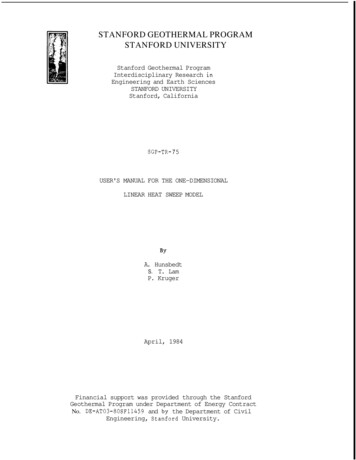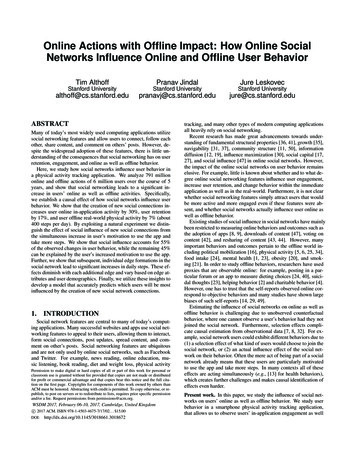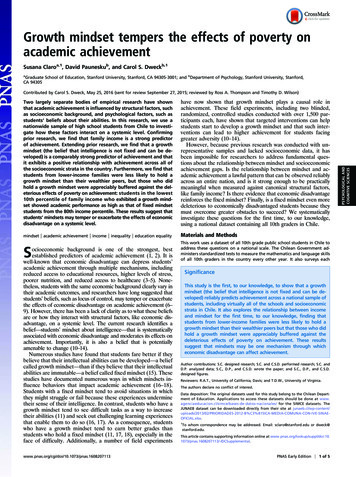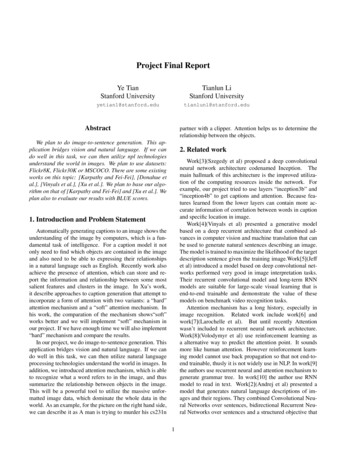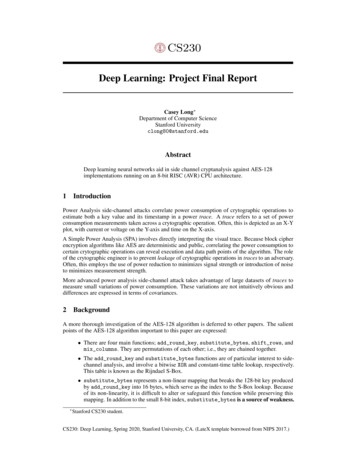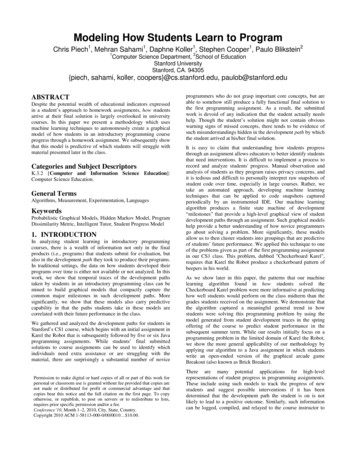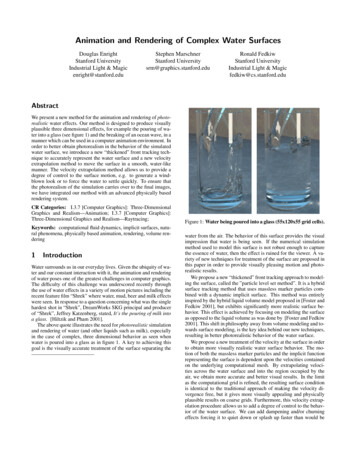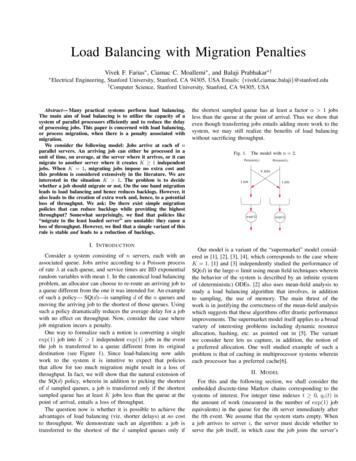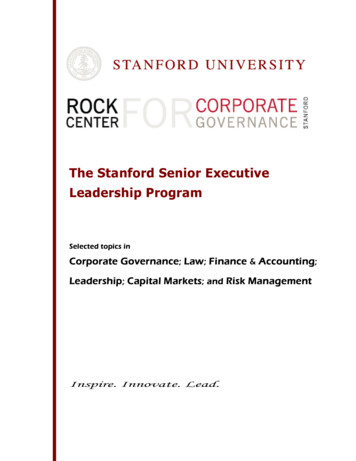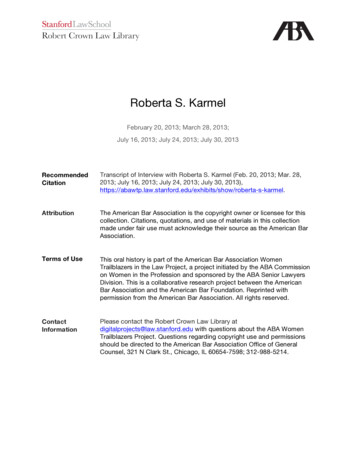
Transcription
Roberta S. KarmelFebruary 20, 2013; March 28, 2013;July 16, 2013; July 24, 2013; July 30, 2013RecommendedCitationTranscript of Interview with Roberta S. Karmel (Feb. 20, 2013; Mar. 28,2013; July 16, 2013; July 24, 2013; July 30, w/roberta-s-karmel.AttributionThe American Bar Association is the copyright owner or licensee for thiscollection. Citations, quotations, and use of materials in this collectionmade under fair use must acknowledge their source as the American BarAssociation.Terms of UseThis oral history is part of the American Bar Association WomenTrailblazers in the Law Project, a project initiated by the ABA Commissionon Women in the Profession and sponsored by the ABA Senior LawyersDivision. This is a collaborative research project between the AmericanBar Association and the American Bar Foundation. Reprinted withpermission from the American Bar Association. All rights reserved.ContactInformationPlease contact the Robert Crown Law Library atdigitalprojects@law.stanford.edu with questions about the ABA WomenTrailblazers Project. Questions regarding copyright use and permissionsshould be directed to the American Bar Association Office of GeneralCounsel, 321 N Clark St., Chicago, IL 60654-7598; 312-988-5214.
ASA Senior Lawyers DivisionWomen Trailblazers in the LawORAL HISTORYofROBERTA S. KARMELInterviewer: Dana Brakman ReiserDates of Interviews:February 20, 2013March 28, 2013July 16, 2013July 24, 2013July 30, 2013
ORAL HISTORY OFPROFESSOR ROBERTA S. KARMELON BEHALF OF WOMEN TRAILBLAZERS IN THE LAWA PROJECT OF THE AMERICAN BAR ASSOCIATIONSENIOR LAWYERS DIVISIONBY PROFESSOR DANA BRAKMAN REISERFEBRUARY 20, 2013Prof. BrakmanReiser:I am Professor Dana Brakman Reiser and I am here with Professor RobertaKarmei, my colleague on the faculty of Brooklyn Law School. Today is February20, 2013 and we are at Brooklyn Law School for our first interview as part of theABA Women Trailblazers Oral History Project. Thank you for meeting with metoday Roberta.Prof. Karmel:It's my pleasure.Prof. BrakmanReiser:So I'd like to start with your childhood and we'll see where it goes from there. Iknow you grew up in Chicago. Were you born there?Prof. Karmel:Yes, I was born in Michael Reese Hospital in Chicago.Prof. BrakmanReiser:And tell me about your family. Did you have brothers and sisters?Prof. Karmel:I had and still have one sister who is three years younger than I am.Prof. BrakmanReiser:Was your family's history in Chicago? Did your parents grow up there too?Prof. Karmel:My parents were both born in Chicago. They knew each other from high schoolon and married in Chicago and lived there all their lives.Prof. BrakmanReiser:And what did you father do?Prof. Karmel:My father was a lawyer. He worked for the City of Chicago for many years whenI was a child. After a time, he became head of the Appeals and Review Division,so he was doing appellate litigation. When he was working for the City ofChicago, Barnett Hodes was the corporation counsel and later on Barnett Hodesjoined others in private practice in a law firm known as Arvey Hodes andMattynband and my father joined that law firm. He eventually became a partnerand practiced law there until he died. There was a brief time in between thecorporation counsel's office and his joining the Arvey Hodes and Mattynband lawfirm when he was in practice either by himself or with one or two other peoplepracticing patent law. He had a master's degree in patent law, and even obtaineda patent on an invention of his own for a children's toy. Unfortunately, it couldnot be manufactured for a price that was viable.·Prof. BrakmanReiser:Did you think about becoming a lawyer seeing your father as a lawyer?160839686vl
Prof. Karmel:Not really. When I was as a young girl becoming a lawyer was not somethingwomen did, but later on when I decided to go to law school, I think I was inspiredto some extent by my father. Everyone always told me my father was a brilliantlawyer, and he was highly respected by others. So I thought since he was good atbeing a lawyer, I'd be good at that profession too.Prof. BrakmanReiser:Did you ever see him in practice? Did you ever go to court with him? Or to hisoffice?Prof. Karmel:I can remember going to his office in City Hall when I was a very little girl andbeing quite impressed by his surroundings. And then later on I rememberattending an argument in court where he was arguing a case.Prof. BrakmanReiser:And was your mother at home with you and your sister?Prof. Karmel:Yes, my sister and I used to tease my mother because she was an "ordinary"housewife.Prof. BrakmanReiser:Did she have an influence on your decision to become a working woman?Prof. Karmel:Well she certainly had an influence on my achievements in life. She believed inwomen achieving what they could in the world. She encouraged me to excel inschool and to think of myself as "special." I think one of her most serious regretsin life was that she never went to college. This was something she had wantedvery much but her family didn't have the money for women to go to college.Also,· she had health problems. When she was 17 she had rheumatic fever andafter that she had heart trouble. I wasn't supposed to be born but I was. I thinkmy mother was a woman of great personal courage. That was one examplehaving children when she was told she probably shouldn't. And, I think shedefinitely was very proud of me all my life. She helped me to go off to an easternschool for college. But by the time I decided to go to law school, I was alreadymarried. So my parents were not a direct influence on my decisions at that pointin my life.Prof. BrakmanReiser:So I wonder if you could talk a little bit about growing up and about school inChicago before you came east to Radcliffe. What motivated you to make thatmove? It sounds like it wasn't typical.Prof. Karmel:It wasn't typical at all. I went to public grade school in the neighborhood where Ilived in Chicago, which was the Austin neighborhood The school was RobertEmmett public school. Because Chicago had neighborhood schools in those days,the student body of Emmett was drawn from the immediate neighborhood ofabout a mile square. Chicago was a city of ethnic neighborhoods, and ourneighborhood was Greek, Irish, and Jewish,--middle class, lower middle class.The Irish kids went to parochial school; most of the Greek kids went to parochialschool also; although a few went to the public school. So, the student body wasprimarily Jewish even though the neighborhood was not entirely Jewish. Theparents were very interested in school and how the kids were doing in class. If the260839686vl
mothers would meet in the grocery, school or the fish market, the conversationwould be something like "so who is the smartest boy in the class". My motheronce reported to me that when she asked another mother "so who's the smartestboy in the class," she was told, "there is no smartest boy in the class, Roberta isthe smartest boy in the class." So, that was my identity to some extent in gradeschool - that I was the smartest one in my grade. I was a good student. I caredabout books. In fact, when I think of my childhood I would say much of it wasspent reading books. It was my primary activity. I would go to the public libraryevery two weeks and take out 14 books and read a book a day.Prof. BrakmanReiser:What kind of books were you reading?Prof. Karmel:Anything and everything. I had no idea what was literature, what was trash, whatwas fiction, what was nonfiction. I read any book that came into my hands.Maybe that was good because it gave me an ability to decide for myself what kindof books I was interested in.Prof. BrakmanReiser:Are you still a big reader?Prof. Karmel:Not as much as I used to be. I should amend that. I do so much reading for myjob. I have very little time to read for pleasure. I tend to read for pleasure whenI'm on airplanes or trips and I often think, "this is so enjoyable. Why don't I dothis more?" But I don't have time. After grade school, I went to Austin HighSchool which was an enormous high school. I once read that at the time it was thebiggest co-educational public school in the country.Prof. BrakmanReiser:How big would that be?Prof. Karmel:4500 students. Now I think there are other schools that are this big that are highschools but then it was unusual. And so I was a bit overwhelmed by the studentbody in the high school. It was a much more mixed group of kids than my gradeschool had been. My grade school was a small group of students who were fromvery similar backgrounds and stayed together. Since my grade school days wereduring World War II, very few people moved anywhere so it was a very stableschool community. High school was an enormous change. In my grade schoolclass I believe there were 35 students and, all of a sudden, high school had anenormous number of students - many of whom terrified me to be honest. I foundthem kind of a rough group.In high school again I was very bookish, and primarily interested in getting goodgrades. But I should add that my primary interest in high school came through aballet company that the high school had. It was a bit unusual, but there was aballet company in the high school and we had ballet every single day at the end ofthe day. We had lessons we had to go to on Saturday morning. And then weoften had rehearsals on Sundays because we put on shows. So this was very muchmy focus in high school. During the summer I went to National Music Camp as adance major. But I never imagined I would become a professional dancer. Iwanted to go to college. But dance was my primary interest. I should say even360839686vl
when I was in grade school I enjoyed putting on theatrical performances of onekind or another. Our great triumph was a performance of Peter and the Wolfwhich I directed and choreographed. This was in seventh or eighth grade. Andwhen the teachers in the school heard about it, they asked us to come and do it inan assembly in the grade school. So theater was a part of my interest when I wasa child.Thinking back, I would say I was kind of entrepreneurial in various ways. Atsome point I started a little ballet school with another girl. We gave lessons toother children. So, I always had little projects of one kind or another going on.Another interest of m:ine, probably either in eighth grade or the beginning of highschool, I can't remember quite when this started, was pen pals. This was a verypopular activity after World War II and there was a magazine where you couldadvertise that you were interested in having pen pals. So I sent in my picture andI had many pen pals from all over the world. I took this enterprise very seriously.I would come home from school and see what letters I had, and respond to them.I wrote to people in other countries about the United States.Prof. BrakmanReiser:Did you ever travel?Prof. Karmel:When I was in first grade, my mother, my sister and I went to Phoenix, Arizonafor several months. My father's oldest brother moved to Phoenix and the wholefamily was supposed to join him. My father studied the Arizona statutes thinkinghe'd take the Arizona Bar. My sister was in poor health and so we went toPhoenix. The climate was supposed to improve her health. In fact, it rainedalmost every day that we were there. It was some sort of record rainfall in thedesert. She was sicker there than she had been in Chicago. This did not work outas an experiment that was successful and we didn't move there. But I rememberhow excited I was about that trip by train across the country to Phoenix. Also, itmade a big impression on me because it was during the war and civilians were notreally supposed to travel. They used to have signs that said "Is this tripnecessary?" So most of the passengers on the train were soldiers. They werereally, really nice to my sister and me. She always fell asleep when we werewaiting in line for dinner, and they would hold her. They would take care ofus. Iremember when we got off the train in Phoenix it was night-time. Some ofsoldiers threw coins at us, pennies, and I didn't really understand what this was allabout. It was as if we were celebrities of some kind. Now that I'm an old lady, Irealize they were just missing their own families and children, and that it wasreally kind of sad. But at the time it seemed very exciting.Prof. BrakmanReiser:Did you have family that was serving in the war?Prof. Karmel:I had some cousins, some older cousins that were in World War II. My father wasjust on the cusp of being too old. When the draft age was raised, we were worriedhe would drafted but he wasn't. He was just a little too old. I had an uncle whowas in the Navy and some cousins who were in the service.Prof. BrakmanDid it feel like a big influence in your everyday life?460839686vl
Reiser:Prof. Kannel:World War II, yes. Definitely. I was very conscious of the war.Prof. BrakmanEven as a young child?Reiser:Prof. Kannel:Yes even as a young child.Prof. BrakmanReiser:And then when it was over and people came back? You were a little bit older.Did that have an influence to you? Did people come back to your neighborhood?Soldiers?Prof. Kannel:Well what had a big impact on my life personally was that after the war my fathergot a letter from a Jewish relief organization (which actually had been sent to hisfather but his father had died in 1941) saying that we had family in France whohad survived the war and giving their address. This was a family where the fatherwas my grandfather's brother but my grandfather had been the oldest child in hisfamily and this man, my Uncle Marco, was the youngest so there was a 20 yeardifference there. Uncle Marco had three sons and my father wrote to them andsaid if any of the boys wanted to come to America he would sponsor them. Oneof them, Charles, did come. I am getting a little ahead of the story here because. what I remember that made a very big impression on me is that every week, Iwould go down to the basement with my father and we would wrap up a foodpackage to send to France to these relatives. And I thought, "why are we sendingthem food?" "Why can't they just go to the grocery store and buy some food". Itmade a big impression on me that they had no food in France or they hadinsufficient food and we had to send them food and other things. I don't knowwhat else we sent. I just remember the food and thinking, "this is very strange,and we're sending food all the way to France." And then the oldest boy of thatfamily, Charles, did come to America and he actually lived in our house for threeor four years. So, he was my father's first cousin but he was like a brother to me.I remained close to him, and I also have had some continuing relationship withone of his sons who has become a lawyer in Paris.Prof. BrakmanReiser:What was Charles' profession? Was he already educated when he came?Prof. Kannel:No. He missed out on an education because of the war. . He was an upholsterer,and a cabinet maker. When he came to Chicago he first worked for a factory, buthe had scorn for the way furniture was made in this factory. He claimed the sofaswere stuffed with newspaper. He eventually opened his own upholstery shop.And he did go to school in the US. I remember going to his eighth gradegraduation where his classmates were primarily immigrants. But that was veryexciting for him and for us too.Prof. BrakmanReiser:He was an adult?Prof. Kannel:He was 24 when he came and I was 12, so this was a big experience of my560839686vl
teenage years having Charles live in our household.Prof. BrakmanReiser:And did other people in the neighborhood have similar experiences?Prof. Karmel:I don't know about that. Charles coming to America was something special in ourfamily. And then you asked me ifl travelled. My next big travel experience waswhen I was a freshman in high school. My best friend moved to LA and I wantedto go visit her. My parents said, "no, you can't do that." They had all kinds ofreasons why I couldn't go. And then finally it came down to the excuse thatparents often use when they just want to say "no", - that it was too expensive.So, I said, "well, if I earn the money myself, can I go?" I suppose my parentswere thinking that I would never be able to do this, so they said, "Yes". Then Iearned the money for that train ticket, which I believe was 96, something likethat. My parents didn't back away, although all my mother's friends said, "you'reletting Roberta go to Los Angeles all by herself?" But that was kind of the dealthat we had made and they let me go. This was an important personal lesson forme in the sense that at this age of 13 or 14, I can remember thinking "if you earnyour own money in life, then you can do what you want and nobody can say youcan't do it."Prof. BrakmanReiser:That seems to have made an impression.Prof. Karmel:It did. It was an important formative experience. And, you may ask, how did a13 year old girl earn all this money? I was a little stymied because you couldn'tget a work permit until you were 15, but I saw an ad in a magazine for sellingwrapping paper, napkins, and other personalized paper products door-to-door. Allyou had to do was mail away for a kit and then you could go around door-to-doorand sell these products, and I earned most of the money selling them. Then therest of it, I earned by babysitting.Prof. BrakmanReiser:Good for you.Prof. Karmel:I remember counting that money out on the kitchen table and really, I've made alot of i;none.y in my life, but no amount of money I ever made was as thrilling asthat 96 for the train ticket to Los Angeles.Prof. BrakmanReiser:Was it a good train trip?Prof. Karmel:It was. It was 39 hours sitting up on the train. And then I got to Los Angeleswhere my friend lived. Of course her parents met me. It was Christmas vacation.This was really an interesting place.· We went to play tennis on Christmas Day,something you could never imagine doing in Chicago, where it was freezing coldwith snow on the ground. And there were all of these pink and blue and yellowhouses. It was a little bit of a fairyland place.Prof. BrakmanReiser:Is the friend someone that you are still in touch with?660839686vl
· Prof. Karmel:No. There was a grade school reunion a number of years ago. This was probably20 years ago and I talked to her on the phone in connection with that reunion. Butshe wasn't able to come. She was in San Francisco. She stayed in California.Prof. BrakmanReiser:Are there other friends from when you were growing up that you are still in touchwith?Prof. Karmel:Not really, except for one high school friend who was in the ballet company withme. Most of my close friends in high school were in the ballet company becausewe were involved with ballet so much of the time. I did make some contact withher a.number of years ago and we got together a number of times. Unfortunately,she died a few years ago.Prof. BrakmanReiser:And were you close with your sister? You mentioned you were three years apart.Prof. Karmel:Well, we spent a lot of time together. It's hard to say whether we were close ornot. I always felt much older than three years older than my sister. I always feltthe relationship was that I was a little more like a mother figure to her. We didspend a lot of time together. As I said, she was rather sickly. Everyone in myfamily had poor health except for me.Prof. BrakmanReiser:So how did you make the decision to go out east to go to Radcliffe?Prof. Karmel:When I was in high school, there were two events that brought me to the attentionof the authorities in the high school. One was that the American Legion had aschool-wide contest in which students were supposed to write an essay on whatthe Pledge of Allegiance means to me and how I'd live it. And I won. The prizewas a silk flag for my homeroom but there was a ceremony with regard to thisprize. Also, the school newspaper had a poetry contest and I won that. Then I hadwhat I guess today would be called an internship for the school guidancecounselor. Mostly it seems to me what she was doing was trying out various kindsof tests on me. I was the guinea pig test taker. But anyway, the guidancecounselor knew me and the principal or the assistant principal knew me becauseof these contests that I won and they recommended to my mother that I go to agood liberal arts college.I did not want to go to the University of Illinois because they had sororities and Ididn't want to join a sorority. It seems like a very foolish reason not to wantto gobut that was my mindset at the time. I had a cousin who was at the University ofIllinois and I went down there one weekend and I said, "this isn't for me." It's notwhat I'm interested in for college. I was a very serious student. So theseguidance counselors recommended Radcliffe and a few other schools. And Ididn't know what Radcliffe was. I said "no, I don't think I want to go to a girls'school." They said "oh it's okay, it's part of Harvard. You'll have your classeswith Harvard." "Oh Harvard, I've heard of Harvard," I said, "Okay, I'll put in myapplication." It was kind of an off-hand decision. But the guidance counselor andI think it was the principal or the assistant principal that really pushed me forward.I would say it was because of them that I applied to Radcliffe and was admitted,760839686vl
although I can remember having to go for an interview with a Radcliffe alum inone of the North Shore suburbs. These were very fancy suburbs then. They stillare. And this woman lived on what had been the theater of a big estate. I wasreally very shy and terrified of the whole interview and it seemed to me that mymother did a lot of the talking, so I felt that my mother got me into Radcliffethrough this interview.Prof. BrakmanReiser:You were with your mother?Prof. Karmel:Yes. Someone had to drive me there. She and this lady got on very well and I feltvery shy and terrified. How much that interview had to do with it, I don't know.There weren't SATs then; there were college boards. I went to a very big highschool, with a graduating class of I believe 385 students who graduated inFebruary.Prof. BrakmanReiser:In February? You graduated in February?Prof. Karmel:I graduated in February. Only three people from my class took the college boardsbecause only about half the students went to college and if you were going tocollege, people would say "are you going downstate or to Navy Pier?" Navy Pierwas the two year University of Illinois school in Chicago. It was literally on theNavy Pier which is now a big amusement center but if you didn't have the moneyto go downstate, you went to Navy Pier. You were a commuter. So that was it, ifyou were going to college, you either went downstate or to Navy Pier and youdidn't need the college boards for the University of Illinois. So there were three ·of us who took college boards which were given in some building ofNorthwestern University on the near North Side. It might have been the medicalschool. I'm not sure and I remember thinking, "oh I don't know if I'm ever goingto find this place." I had to take two busses to get there. I was really much moreworried about finding the location of the exam than about the exam itself. And, inthose days they didn't tell you how you did. So I suppose I must have done wellor I wouldn't have gotten into Radcliffe. I did not finish all of the math questions.I remember thinking the English part was kind of easy and the math was hard.But they didn't tell you your grade on the college boards. Actually I went to theUniversity of Michigan for a semester.Prof. BrakmanReiser:Oh really.Prof. Karmel:Because I graduated in February and then I was admitted to Radcliffe and Idecided I wanted to go there. So in September I went to Radcliffe and it was goodthat I had gone to the University of Michigan for a semester and taken collegecourses. My high school really was not a very good school, and I think I wouldhave had much more trouble at Radcliffe keeping up with the other women if Ihad not had some college courses that I had taken for that one semester at theUniversity of Michigan.Prof. Reiser:Was it true what they told you? Did you have access to Harvard?860839686vl
Prof. Karmel:Our classes were co-ed. I think the co-ed classes only started in the 50s. But ourclasses were completely co-ed. On the other hand, Radcliffe was a separateschool at that time. And there were many more Harvard men than Radcliffewomen. When the two schools merged, the deal was then there would be 50/50admission. I'm really sad that my college disappeared, although I am happy thatmore women now have a chance to go to Harvard.Prof. Reiser:Do you feel a great affinity for Radcliffe? Did it mold you?Prof. Karmel:I think it opened up doors for me for the rest of my life. And I think it also gaveme a certain way of looking at politics and history and literature that wasimportant. I majored in history and literature which really was intellectual history- that's really what the major was. It gave me a certain framework for looking atpolitics and events, and even books that I read.Prof. BrakmanReiser:Did you continue on in Boston during the summers or did you go home toChicago?Prof. Karmel:Well after my freshman year I went home. I didn't really want to go home at thatpoint but I went home. And, after my sophomore year I got married.Prof. BrakmanReiser:Was your husband also at school?Prof. Karmel:He was getting a master's degree at MIT the year that we were going out. Thenafter the end of my sophomore year we were married and we lived in Boston inBack Bay and we did spend two summers in Chicago.Prof. BrakmanReiser:How did you meet if he was at MIT and you were at Radcliffe?Prof. Karmel:It was a blind date. My roommate was going with some guys on a road trip forthe weekend and Paul, my late husband, was the roommate of the person who wasgoing to drive her. And she said "oh, would you go on a .date with these people asa favor to me?" I said, "Okay, who are they." She said, "Oh some dumb engineersat MIT." She never actually approved of Paul. She didn't care for him much.But we got married.Prof. BrakmanReiser:Wow. So what was it like being married when you were in college? Was thatcommon then?Prof. Karmel:No. I was very anxious to become a grown-up. I wanted to get out of dorm. Ididn't care for dorm life very much. I wanted to be a grown-up. And I was veryhappy to get married. Also, I guess I have to go back to something that shows themaking of a lawyer at a young age. When I was about to go to college, my fathersaid to me, "well you should study something practical. Get a teaching certificatein case you ever have to work". And I said, "well I'll think about that". And thenI said, kind of offhand, "I don't really like children that much. I don't think that'swhat I want to do." But then he said, "this is very expensive sending you to thiseastern school and so the reason that I say that is that I will pay for four years ofcollege but that's it. Then you're on your own." And I said, "what ifl get960839686vl
married when I am in school, will you still pay for the rest of college?" And hesaid "yes." So when I was ·going to marry Paul, he was a little concerned aboutour getting married when I was still in college. He said, "I don't know ifweshould get married yet because I don't have any money or very little." His parentshad both died. And I said, "don't worry; My father is going to pay for the rest ofcollege." But then interestingly when it was time to go to law school, I neverasked my father for the money to go to law school. I thought, "we made a deal,he paid for the rest of college and now I'm on my own and if I'm going to lawschool that's not something I expect him to pay for."Prof. BrakmanReiser:Right. And how did you decide to go to law school?Prof. Karmel:Well, I also graduated from college in February.Prof. BrakmanReiser:You were always in a hurry Roberta.Prof. Karmel:I was always in a hurry to be a grown-up. And even though I started Radcliffe inSeptember, I went to summer school one summer and took some extra coursesand graduated in January. And then I went looking for a job. And I found outthat despite my fancy Radcliffe degree in Boston at that time, there was no greatdemand for someone like me in the working world. And I thought I really should o something where I can work for at least for a while because I felt I was tooyoung to start a family. I was only 22 and I wanted to work. And so I decided totake the LSATs because the Dean at Radcliffe did encourage women to go to lawschool or medical school. That was an acceptable path. So I said "all right, I'lltake the LSATs and ifl do well, then maybe I'll apply to law school."Prof. BrakmanReiser:Did they tell you if you did well?Prof. Karmel:Yes. Then they told you how you did. And actually, I remember I did not do aswell as some of my male classmates who I took the exam with. And I went in tospeak to the Dean at Radcliffe, Dean Kirby Miller and I said, "well I don't knowif this is a very good score because other people have 'done better." And she said,"oh it's good enough to get into Harvard Law School" because in those days,Harvard had just begun accepting women and if you went to Radcliffe and youdid at all well at Radcliffe and on the LSATs, you got into Harvard Law School. Isaid, "well what if I want to go somewhere else? Are they good enough scores togo somewhere else?" She had always thought I was, a bit of a nai'.ve and oddballpersonality. She had advised against my graduating in February saying "when areyou going to have time for reading and reflection?" I've always remembered thatbecause I haven't found the time yet in my life. But anyway, my attitude was iflget into law school, I really can't go unless I get a scholarship. Paul, my latehusband, was also deciding to go back to graduate school and he and I appliedhere and there. I think we were pretty co
once reported to me that when she asked another mother "so who's the smartest boy in the class," she was told, "there is no smartest boy in the class, Roberta is the smartest boy in the class." So, that was my identity to some extent in grade school - that I was the smartest one in my grade. I was a good student. I cared about books.
